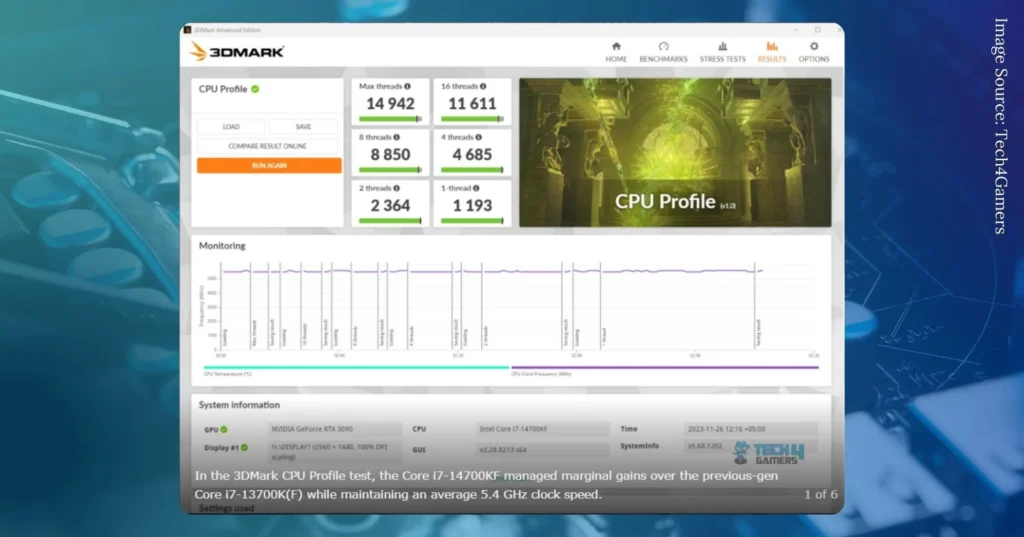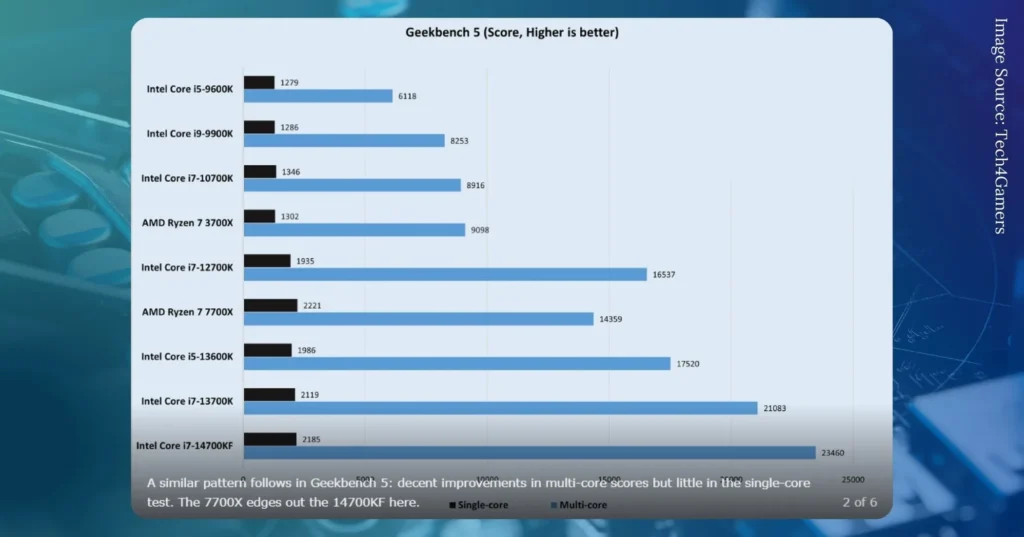The Intel Core i7-14700KF promises to deliver meaningful improvements in multi-threaded workloads through its upgraded core configuration compared to its predecessor, the Core i7-13700K. This comprehensive guide will look at Intel’s latest mid-range CPU in-depth to see if it meets expectations. So, let’s jump in and explore everything this processor offers!
Beefier Specs Pack More Punch for Productivity
One of the first things enthusiasts look at is specifications, so let’s start there. With the Core i7-14700KF, Intel has equipped it with 20 cores, increasing over the 13700K’s 16 cores. These cores comprise eight performance cores and 12 efficient cores. Its core and thread count now stands at 20 cores (8P + 12E) with 28 threads total.
Clock Speed Upgrades
Intel has also bumped up the clock speeds. The 14700KF features a 300MHz boost over its forerunner, with a maximum boost of 5.6GHz on the performance cores and 4.3GHz on the efficient cores. The base clock remains unchanged at 3.4GHz.
Cache Specification Increases
In addition, it comes with more L2 and L3 caches, a helpful increase of 33MB L3 caches and 28MB L2 caches, compared to the 13700 K caches, which are 30MB and 24MB, respectively.
These incremental but impactful spec upgrades point to the 14700KF delivering more robust performance than its forebear, especially in threaded workloads that can leverage more cores. Let’s examine how it fares in benchmarks.
| Specification | Value |
| Cores | 20 (8 Performance + 12 Efficient) |
| Threads | 28 |
| Base Clock | 3.4GHz |
| Boost Clock | 5.6GHz (P-Cores), 4.3GHz (E-Cores) |
| Cache | 33MB L3, 28MB L2 |
| Cinebench R23 Multi-Core Score | 5459 Points |
| Performance Uplift vs 13700K (Cinebench) | 0.125 |
| Performance Uplift vs 13700K (Rendering) | 14.83 |
| Performance vs. 13900K | On par |
| Gaming Performance Uplift vs 13700K | 0.03 |
| Thermal Performance (Max Temp) | 80°C |
| Power Draw (Turbo Limit) | 253W |
| Power Draw (No Limit) | 300W+ |
| Upgrade Option for Creators | Compelling |
| Value for Gamers | Diminishing returns vs 13700KF |
| Cooling Requirement | High-end AIO/Tower cooler |
| Power Efficiency vs AMD | Lower than Zen 4 |
| Performance for Workflows | Strong multi-threaded muscle |
Benchmark Results: Productivity Powerhouse
The Core i7-14700KF was put through its paces in various benchmark tests. Results showed its performance scaled effectively with core counts. Multi-threaded workloads saw the most significant gains over predecessors. Let’s examine some of the critical benchmark results in detail.
Multi-threaded Performance
As expected from the core count increase, the 14700KF shows significant gains over the 13700K in multi-threaded benchmarks. In Cinebench R23 multi-core, it achieves a score of 5459 points – a solid 12.5% improvement. Similarly, it bests the 13700K by around 15-17% in rendering tests like Blender, Corona, and V-Ray that can utilize those extra cores.
On Par with Flagship Chips
Interestingly, despite sitting two tiers below, the 14700KF manages performance on par with Intel’s flagship Core i9-13900K in these workloads. As the benchmarks show, its “more cores than the Core i7-13700K” approach proves highly effective for productivity.

Single-core Performance
Its single-core prowess isn’t too shabby either. The 14700KF pulls ahead of AMD’s Ryzen 7000 CPUs in Cinebench and stays neck-to-neck with them in Geekbench single-thread. While gaming performance gains are more marginal at around 3% versus the 13700K, the extra cores have an upside – they distribute lighter tasks away from the performance cores, allowing them to clock higher under combined loads.
The Core i7-14700KF delivers a productivity-focused feature set, making it a strong contender, even against Intel’s flagship CPUs. Its multi-threaded muscle is its greatest asset. Let’s analyze how it fares in other vital areas next.
Read also: Ultimate Guide: Top Motherboards for Intel i9-14900K
Thermal Headroom Needs Serious Cooling Help
The Core i7-14700KF was put through its paces in various benchmark tests. Results showed its performance scaled effectively with core counts. Multi-threaded workloads saw the most significant gains over predecessors. Let’s examine some of the critical benchmark results in detail.
High Temperatures Under Load
Like other power-hungry Intel chips, cooling is paramount for getting the most out of the 14700KF. Under stress tests, it was observed that it hit a maximum temperature of 80°C with a top-tier AIO liquid cooler like the Arctic Liquid Freezer II 360mm attached. Reaching the turbo power limits also drove power draw upwards of 300W without enforced limits!
Manageable Temps at Stock Settings
At stock settings, though, temperatures settled to a more manageable mid-70s Celsius range. But the thermal output is still considerable. With robust cooling, the 14700KF may maintain boost clocks for long under heavy rendering loads. This differs from AMD’s efficiency-focused Zen 4 chips, which run much cooler by design.
A premium high-end AIO or capable tower-style air cooler would be the recommended setup to properly tame this beast and keep it running at peak speeds continuously. While able multi-taskers will benefit from the 14700KF’s performance potential, its thermal characteristics demand serious cooling firepower and more significant power costs. The utility bill must also be considered.
Read also: A Comprehensive Review of the Asus Zenbook Duo (2024)
Value Proposition Depends on Workflow
As a creation station, there’s clear merit to the 14700KF’s uplifted multi-threaded abilities. Content creators upgrading from older platforms will find substantially better speeds for workflows.
However, there is less incentive for gamers coming from the 13700K. The marginal 3% gaming boost doesn’t offset its price reductions. Additionally, AMD’s Ryzen 7 5800X3D currently goes for close to the 14700KF’s MSRP while offering better gaming performance, thermals, and efficiency.

For heavy gamers, the 14700KF’s higher power usage and thermal output diminish its value proposition compared to rival chips. The overall value depends highly on workload characteristics.
Closing Verdict: A Powerhouse For the Right User
The Core i7-14700KF flexes its muscles impressively in multi-threaded creative workloads. Professionals upgrading from older systems will find clear benefits from its computing power. However, some compromises exist for other user types.
While capable, the 14700KF offers less appeal for gamers due to modest gains and disadvantages in efficiency. Enthusiasts on a budget also have alternatives like waiting for 13th-gen discounts or considering AMD’s better value.
Ultimately, the 14700KF proves a credible solution for multi-tasking tasks where cores provide a clear advantage. However, drawbacks in other areas mean it may be a better fit for some workflows. This guide helps you determine where the 14700KF suits your needs.



















